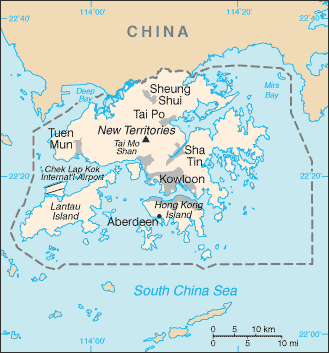
Jimmy Quinn has written an op-ed for National Review entitled "Let Hong Kongers Come to the United States". I take as a given Quinn's good intentions. And I hold deep sympathies for Hong Kong residents; at least those who are adamantly opposed to the ruthless dismantling of their democracy by the People's Republic of China (PRC). This is happening despite the PRC's agreement with the UK to maintain the status quo as a condition of turnover of this former crown colony, which was ruled by the UK from 1841 to 1997. But Quinn's proposal is a terrible idea and should be given no countenance for several reasons.
First and foremost are the long historical ties between the UK — not the United States — and Hong Kong. The UK surrendered the former colony in 1997 and holds some responsibility for the fallout of that agreement, which it knew or should have known would never be honored by the Chinese Communist Party (CCP). And, in fact, it has taken responsibility by offering millions of Hong Kongers a path to citizenship despite heavy-handed threats from the CCP to take punitive measures for doing so.
Second, where U.S. immigration policy is concerned, we've been down this path before, with sometimes undesirable results. While it's heartwarming to think of all Hong Kongers as standing steadfast in the face of political, police, and quite possibly military actions to crush resistance, it simply isn't accurate. There are any number of Hong Kongers who sit passively indifferent to (and sometimes even secretly in favor of) the recent iron fist exhibited by mainland authorities. If we are so foolish as to pass a law enabling Hong Kong residents to obtain permanent entry to the United States en masse under whatever status is settled on, there will be thousands of grifters, opportunists, con men, criminals, liars and fraudsters, and political neutrals who will seize the moment to immigrate. Then, of course, there are the spies whom the PRC will inevitably send into the pipeline with the intent to worm their way into U.S. society and, from there, into positions giving them access to U.S. secrets.
Why is this any of this in our interest? We've seen these things happen innumerable times. Think of the Cuban Adjustment Act, the Lautenberg Amendment, and the statutory requirement to grant asylum to PRC nationals claiming persecution for the one-family-one-child policy. Painting with a broad brush always results in unintended consequences.
For those who would argue that stringent vetting is the answer to the thorny problem of ineligibles riding the wave: Where have you been for the last 20 years? Time after time, we see instances of so-called "vetted" individuals who come and engage in crime, terrorism, and other acts of adverse consequence to our culture and our people. There is no comprehensive science of vetting because it requires us to know the complexities of the human mind and motivations, and to be able to peer completely into past histories and connections that will to a great extent always be unknowable. Neither our intelligence nor visa and immigration agencies will ever be fully up to that task.
Third, whenever our Congress in its infinite un-wisdom (or our presidents, acting under their plenary authorities granted by the Immigration and Nationality Act) have gone down this path in the past, it has in short order engendered me-tooism. Grant special access or favored status to one group and a dozen more, with their assorted special interest groups, will be banging on the door demanding similar treatment. No good deed goes unpunished, and the rule of unintended consequences will prevail.
Fourth and final, there is no need to craft a law of broad access. If the intent is to grant succor to those who are truly working to reject the oppression of the CCP and who suffer the consequences, then U.S. refugee and asylum laws already operate in ways designed to ensure that they can receive safe haven and protection.
